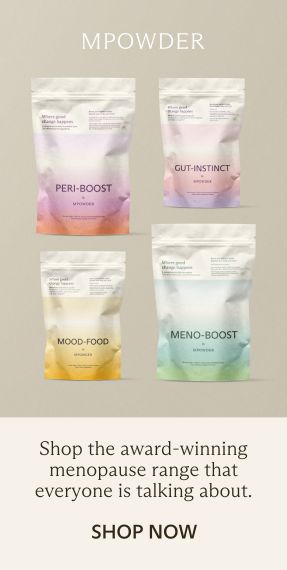The feeling that your body has fundamentally changed. The tightness of clothes. The worry you’ll feel distended if you go for dinner with friends, or gassy in an exercise class.
Perimenopause bloating is common. But it is also commonly misunderstood. We often don’t realise it’s a symptom of hormonal transition. And we can often reach for solutions that can hinder rather than rebalance too.
At MPOWDER, we believe in working with the body, not fighting against it. As a first step, whenever you notice a shift, you must book time with your medical provider. Then, if any underlying health concerns have been ruled out, nourishing the gut gently back into balance is the best place to start. This guide explores what causes perimenopause bloating, and what to take to help your gut (and you) feel in tune.
Why does perimenopause cause bloating?
During perimenopause, fluctuating levels of oestrogen and progesterone affect fluid retention, digestion and gut motility. High oestrogen can cause the body to retain more water, while low progesterone can slow digestion and lead to constipation and trapped gas.
These hormonal changes can also impact the gut microbiome — the diverse community of bacteria that regulate digestion, immunity, and even mood.
The good news? You can take steps to support your gut health — and reduce perimenopause bloating — from the inside out.
The best supplements to take for perimenopause bloating
1. Prebiotics and gut-specific fibre
Feeding your beneficial gut bacteria is key during perimenopause. Prebiotic fibres support healthy digestion and reduce gas and inflammation.
Found in: GUT-INSTINCT, which includes ACTAZIN® kiwi powder, a clinically studied prebiotic, alongside slippery elm, ginger, and marshmallow root
2. Slippery elm and marshmallow root
These soothing mucilaginous herbs coat the digestive tract, reduce irritation, and ease both bloating and constipation.
Found in: GUT-INSTINCT and MENO-BOOST
3. Magnesium
Helps to relax the digestive muscles, reduce water retention, and ease constipation-related bloating.
Found in: PERI-BOOST and MENO-BOOST
4. Ginger root extract
Well-researched for its ability to improve digestion and reduce bloating, nausea and gas.
Found in: GUT-INSTINCT
5. B vitamins
Support the nervous system and reduce stress-related gut symptoms (including bloating triggered by cortisol).
Found in: PERI-BOOST, MENO-BOOST, and MOOD-FOOD
Internal support, external ease
When dealing with perimenopause bloating, it’s important to take a holistic view. Movement, hydration, and nervous system regulation (through breathwork or meditation) can all improve gut motility and reduce symptoms too.
Where to begin
If bloating is a regular part of your perimenopause experience, consider starting with:
- GUT-INSTINCT: For targeted digestive relief, microbiome balance and gut lining support
- PERI-BOOST: If you're still cycling regularly and want foundational hormonal and digestive support
-
MENO-BOOST: If you're in menopause and need whole-body balance, including gut support
Explore our full Bloating Collection for more supportive tools and powders.
Midlife should never feel restrictive
Perimenopause bloating doesn’t have to become your norm. And you shouldn’t have to limit your day, your food, or your self-expression because of discomfort. The beauty of our biochemistry is that it responds at pace to any intervention we make. The gut is no exception. Commit to feeding it well, and the rest will follow.
Share Twitter Facebook Pinterest

